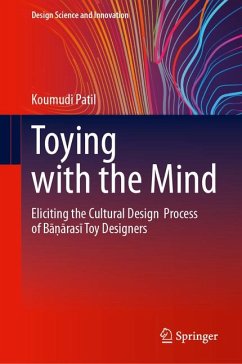This book offers a critical re-examination of cultural design, highlighting the distinct cognitive framework for problem-solving that emerges from culturally specific practices, knowledge systems, and evaluative mechanisms. Through the lens of Banarasi toy designers a community on whom linguistic analysis has previously revealed a deeply embedded system of design categorization and experiential practice this book explores how generational tacit knowledge is internalized, transmitted, and applied.
Challenging dominant paradigms that privilege global scalability and technological disruption, the book advocates for a localized approach to innovation that emphasizes cultural acceptability, continuity, and systemic coherence. Cultural design is presented not only as a method for solving problems within culturally bounded contexts but also as a pedagogical strategy for converting implicit expertise into formalized, transferable knowledge.
This volume contributes to the emerging discourse on culturally grounded design methodologies that prioritize cultural acceptability over disruptive change to foster more sustainable, community-aligned innovation ecosystems. This can be a useful resource for scholars, educators, practitioners, policymakers, investors, and market analysts seeking to engage with alternative models of innovation that honor cultural specificity while fostering equitable development.
Challenging dominant paradigms that privilege global scalability and technological disruption, the book advocates for a localized approach to innovation that emphasizes cultural acceptability, continuity, and systemic coherence. Cultural design is presented not only as a method for solving problems within culturally bounded contexts but also as a pedagogical strategy for converting implicit expertise into formalized, transferable knowledge.
This volume contributes to the emerging discourse on culturally grounded design methodologies that prioritize cultural acceptability over disruptive change to foster more sustainable, community-aligned innovation ecosystems. This can be a useful resource for scholars, educators, practitioners, policymakers, investors, and market analysts seeking to engage with alternative models of innovation that honor cultural specificity while fostering equitable development.








